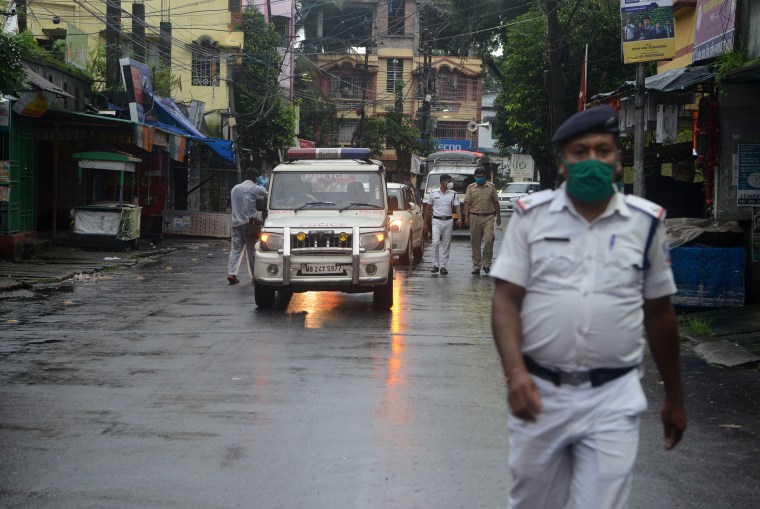New Delhi, July 13, 2020 – West Bengal authorities must immediately release journalists Suraj Ali Khan and Safikul Islam, as well as Islam’s wife, Alima Khatun, and drop all the charges against them and investigations into their work, the Committee to Protect Journalists said today.
At about 3 a.m. on June 29, police arrested Khan and Islam at Islam’s home in Arambagh, in the Hoogly district of West Bengal, for alleged extortion, and also arrested Khatun, their lawyers, Pintu Karar and Samim Ahammed, told CPJ over the phone.
Khan works as a reporter and Islam as an editor and owner at Arambagh TV, a news channel on YouTube that has about 130,000 followers, their lawyers said. Police also detained Islam and Khatun’s two children during the arrests, but later released them, Ahammed said. CPJ could not determine on what grounds police were holding Khatun.
The journalists’ arrests were prompted by a complaint filed just after midnight on June 29 by a local resident, whose name was not disclosed, who alleged that Islam and Khan had photographed him cutting down a tree on government land, a criminal offense, on March 16, and then extorted money from him in exchange for not publishing the image, Ahammed said.
The journalists’ lawyers told CPJ that they believe the arrests were actually retaliation for Islam and Khan’s reporting on alleged corruption in government funds distributed to private clubs amid the COVID-19 pandemic.
“The arrests of Arambagh TV editor Safikul Islam and reporter Suraj Ali Khan, as well as of Islam’s wife, are clear attempts to intimidate the journalists and force them to stop their critical reporting,” said Aliya Iftikhar, CPJ’s senior Asia researcher, in New York. “The three should be released immediately and all investigations into them dropped. West Bengal police must cease harassing journalists for their work.”
Karar and Ahammed told CPJ that they have moved their case to the state High Court after a lower court refused to grant bail, and said the next hearing is set for tomorrow.
If charged and convicted with extortion, the journalists could face up to three years in jail and a fine set by a judge, according to the Indian penal code.
According to documents reviewed by CPJ, the West Bengal police have also opened five other investigations into Islam and Khan in recent months. In two cases opened on April 28 and others opened on May 6, 13, and 14, police have investigated the journalists for alleged cheating, forgery, defamation, public mischief, criminal conspiracy, wrongful restraint, provocation that will break public peace, criminal intimidation, disobeying a public servant, obstructing a public servant in discharge of public functions, causing grievous harm to a deter public servant from his duty, and assault or criminal force to deter a public servant from the discharge of his duty, according to those documents.
Police are also investigating Khan and Islam for allegedly violating sections of the Disaster Management Law, which was invoked in March due to the COVID-19 pandemic, and for making false statements and printing or publishing news without conforming to rules under the Press and Registration of Books Law, according to those documents.
On June 2, the Calcutta High Court instructed the police not to take any coercive action against Islam or Khan in relation to the investigations, as the journalists assured the court that they would cooperate with authorities and would be physically present at the police station whenever summoned for questioning, according to Karar.
Islam and Khan followed the court’s instructions and appeared before the Arambagh police for questioning on June 10, Karar said.
CPJ emailed Hooghly Rural Superintendent of Police Tathagata Basu, who oversees the police responsible for the journalists’ arrests, for comment, but did not receive any reply. In a press conference held on July 4, Basu denied wrongdoing on the part of police and claimed that Islam was being investigated for fraud and that Arambagh TV was run illegally, without government permission.
Ahammed told CPJ that no regulatory permission is required under Indian law to run an internet-based news outlet.
Previously, in early May, Arambagh TV posted two videos in which Islam and Khatun separately claimed that mobs of 30 to 40 people had surrounded their homes and threatened them over their coverage.
In June, the West Bengal police opened an investigation into the editor of Bengali-daily Anandabazaar Patrika following a complaint from a senior bureaucrat over the newspaper’s coverage of the COVID-19 pandemic, as CPJ documented at the time.
